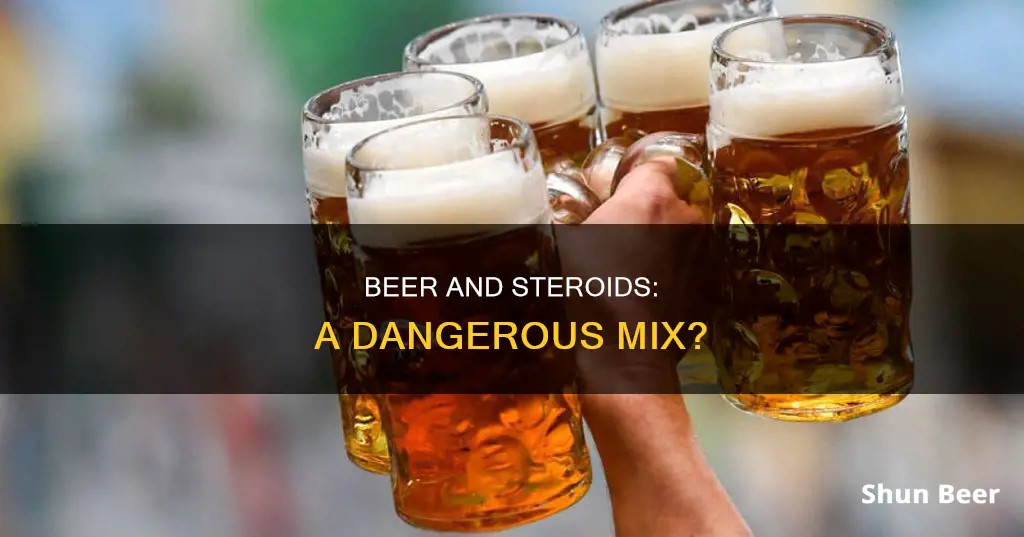
Mixing steroids and alcohol is generally not recommended, as it can increase the risk of several side effects. Steroids are synthetic hormones often prescribed to reduce the body's inflammatory response, while alcohol can have numerous effects on the body and is considered a drug. When taken together, steroids and alcohol can overexert the liver, increase the risk of gastrointestinal problems, weaken the immune system, change blood sugar levels, and negatively impact mental health. The specific steroid prednisone, for example, may affect metabolism and how alcohol is processed in the body. As such, it is important to consult a doctor before consuming alcohol when taking steroids, as they can advise on potential interactions and risks based on individual medical history.
| Characteristics | Values |
|---|---|
| Can you drink alcohol while on steroids? | There is no direct drug interaction between steroids and alcohol. However, it is not a good idea to mix them as both have similar side effects, and taking them together can increase the risk of these side effects occurring. |
| What are the side effects of mixing steroids and alcohol? | Changes in blood sugar levels, damage to the stomach and GI tract, dehydration, development of diabetes type 2, immune system suppression, impaired wound healing, osteoporosis (weakening of the bones), pancreatitis (inflammation of the pancreas), slower wound healing, suppression of the adrenal glands, high blood pressure, mental health issues, gastrointestinal problems, etc. |
| What factors determine whether it is safe to mix steroids and alcohol? | The dosage of the steroid, the length of the course of treatment, how frequently a person uses alcohol, and other medical conditions the person may have. |
What You'll Learn
- Alcohol and steroids can both suppress the immune system, making it harder to fight infections
- Combining steroids and alcohol can increase the risk of type 2 diabetes by affecting blood sugar levels
- Both substances can irritate the digestive tract and cause peptic ulcers
- Excessive alcohol consumption and long-term steroid use may increase the risk of osteoporosis
- Mixing steroids and alcohol can increase the risk of organ damage, mental health problems, and other side effects

Alcohol and steroids can both suppress the immune system, making it harder to fight infections
Steroids are synthetic versions of hormones that occur naturally in the human body. Doctors often prescribe them to decrease the body's inflammatory response in people with rheumatoid arthritis or systemic lupus erythematosus. There are two types of steroids: corticosteroids and anabolic steroids. Corticosteroids mimic the hormone cortisol, while anabolic steroids are human-made versions of testosterone.
The suppression of the immune system by alcohol and steroids can have several negative consequences. Firstly, it increases the risk of infections, as the body's defence mechanism is weakened. Secondly, it can prolong the recovery time from infections, as the body's ability to fight off pathogens is reduced. This can be particularly harmful for individuals with underlying health conditions or those taking steroids for an extended period.
Furthermore, the combination of alcohol and steroids can lead to other health complications. Both substances can irritate the digestive tract and cause peptic ulcers. They can also disrupt blood sugar levels, potentially leading to steroid-induced diabetes. Additionally, the excessive consumption of alcohol and steroids can contribute to osteoporosis by weakening bones and increasing the risk of fractures.
It is important to note that the effects of combining alcohol and steroids depend on various factors, including the dosage of steroids, the duration of treatment, the amount of alcohol consumed, and the individual's medical history. Therefore, it is always advisable to consult a healthcare professional before consuming alcohol while taking steroids. They can provide personalised advice based on your specific circumstances.
A Day at the Beer Hall: A Beginner's Guide
You may want to see also

Combining steroids and alcohol can increase the risk of type 2 diabetes by affecting blood sugar levels
Steroids are synthetic versions of hormones that occur naturally in the human body. They are often prescribed to decrease the body's inflammatory response in people with rheumatoid arthritis or systemic lupus erythematosus. There are two types of steroids: corticosteroids and anabolic steroids. Corticosteroids mimic the hormone cortisol, while anabolic steroids are human-made versions of testosterone.
When it comes to drinking alcohol while taking steroids, there is no clear answer regarding its safety. However, it is known that alcohol can worsen the side effects of steroids, and combining the two can lead to severe health problems. Both substances can suppress the immune system, making it more difficult for the body to fight infections. Additionally, steroids and alcohol can negatively affect blood sugar levels, increasing the risk of type 2 diabetes.
Steroids can cause high blood glucose (sugar) levels, which can lead to steroid-induced diabetes. This condition occurs when the liver becomes resistant to insulin, resulting in increased blood sugar levels. The risk of developing steroid-induced diabetes is higher in individuals who are already at risk for type 2 diabetes or have taken steroids for a prolonged period.
Alcohol also impacts the liver's ability to regulate blood sugar. It interferes with the liver's function of storing glycogen, the stored form of glucose. When alcohol is consumed, the liver has to work on removing it from the bloodstream instead of regulating blood sugar. This disruption can lead to a rise or fall in blood glucose levels, depending on the amount of alcohol consumed.
Combining steroids and alcohol can further increase the risk of type 2 diabetes by affecting blood sugar levels. Steroids can cause the liver to release more glucose, prevent muscle and fat cells from absorbing glucose from the blood, and reduce the body's sensitivity to insulin. At the same time, alcohol impairs the liver's ability to produce glucose and can cause blood glucose levels to drop suddenly. This combination of effects can lead to a dangerous imbalance in blood sugar levels, increasing the likelihood of developing type 2 diabetes.
Therefore, it is essential for individuals taking steroids, especially those at risk for diabetes, to be cautious about consuming alcohol. Consulting with a healthcare provider is crucial to understanding the potential risks and safely managing both conditions.
Beer Diet: Does It Work?
You may want to see also

Both substances can irritate the digestive tract and cause peptic ulcers
Steroids and alcohol can both irritate the digestive tract and cause peptic ulcers. This is because steroids inhibit prostaglandins, which are substances that help protect the stomach lining. Excessive irritation can lead to stomach ulcers. The risk of developing peptic ulcers is further increased when steroids are taken in combination with non-steroidal anti-inflammatory drugs (NSAIDs).
Prolonged steroid use has been linked to an increased risk of peptic ulcers. A recent study found that corticosteroids alone become ulcerogenic if the treatment lasts longer than one month and the total administered dose exceeds 1000 mg. However, the incidence of steroid-induced ulcers in clinical practice is relatively low.
To reduce the risk of stomach irritation and peptic ulcers, it is recommended to take oral steroids with food and avoid other medications that can irritate the stomach, such as NSAIDs. Additionally, seeking medical advice before consuming alcohol while taking steroids is advisable, as both substances can irritate the digestive tract and increase the risk of peptic ulcers.
In summary, both steroids and alcohol can irritate the digestive tract and contribute to the development of peptic ulcers. It is important to be cautious when consuming alcohol while taking steroids, as the combination may increase the risk of stomach-related issues.
Lovastatin and Beer: A Safe Mix?
You may want to see also

Excessive alcohol consumption and long-term steroid use may increase the risk of osteoporosis
While moderate alcohol consumption may not significantly affect bone health, excessive drinking over a long period can negatively impact your bones. When combined with long-term steroid use, the risk of osteoporosis increases.
Steroids are synthetic hormones that mimic the body's natural hormones, such as cortisol and testosterone. They are often prescribed to reduce inflammation in people with conditions like rheumatoid arthritis or asthma. However, steroids come with a range of side effects, including a weakened immune system, disrupted blood sugar levels, digestive issues, and weakened bones.
Osteoporosis is a condition characterised by bone loss and deterioration of bone microarchitecture. Steroids can accelerate bone loss, especially when taken in high doses or for extended periods. The risk is particularly high for postmenopausal women who take steroids long-term.
Alcohol consumption further increases the risk of osteoporosis and fractures. Excessive drinking can negatively affect bone formation and the body's ability to absorb calcium, a crucial mineral for bone health. Therefore, when combined with steroid use, the risk of osteoporosis is heightened.
To reduce the risk of osteoporosis, it is recommended to limit alcohol consumption, especially when taking steroids. Additionally, a well-rounded diet rich in calcium and vitamin D, regular exercise, and smoking cessation are crucial for maintaining bone health.
Understanding Beer Bikes: How Do They Work?
You may want to see also

Mixing steroids and alcohol can increase the risk of organ damage, mental health problems, and other side effects
Steroids are synthetic versions of hormones that occur naturally in the human body. Doctors often prescribe them to decrease the body's inflammatory response in people with rheumatoid arthritis or systemic lupus erythematosus. However, some athletes misuse steroids as performance-enhancing drugs. There are two types of steroids: corticosteroids and anabolic steroids.
Corticosteroids mimic the hormone cortisol, while anabolic steroids are human-made versions of testosterone. The main concern about mixing steroids and alcohol is that alcohol can worsen the side effects of steroids. While there is no clear answer to whether it is safe to drink alcohol while taking steroids, the effects will depend on several factors, including the dosage and duration of steroid use, as well as the patient's alcohol consumption habits and medical history.
Mixing steroids and alcohol can have serious health risks. Both substances can overexert the liver, leading to cirrhosis or liver failure. They also contribute to high blood pressure, which is a major risk factor for organ damage. Additionally, people with an alcohol use disorder are at an even higher risk for these adverse effects.
The combination of steroids and alcohol can also worsen mental health issues associated with steroid use, such as mania, psychosis, and mood swings. This mixture can increase the potential for violence and physical harm. Other side effects of mixing steroids and alcohol include gastrointestinal problems, weakened immune system, changes in blood sugar levels, mental health issues such as depression or anxiety, and steroid-induced diabetes.
Therefore, it is generally recommended to avoid drinking alcohol while taking steroids. The risks of organ damage, mental health problems, and other side effects are significantly increased when these two substances are combined. Always consult with a healthcare provider for medical advice regarding steroid use and alcohol consumption.
Beer and Health: One Beer a Day, Okay?
You may want to see also
Frequently asked questions
It depends on the type of steroid, the dosage, and the length of your treatment. It's always best to consult a doctor before drinking alcohol while on steroids.
Both alcohol and steroids can suppress the immune system, change blood sugar levels, irritate the stomach and gastrointestinal tract, and weaken bones. Combining the two may increase these side effects, especially if you are already prone to indigestion or stomach issues.
It depends on the type of steroid you are taking and other individual factors. In general, drinking one or two beers per day should be fine if you are taking a low dose of steroids for a short period of time. However, it is always best to consult your doctor for specific advice.







